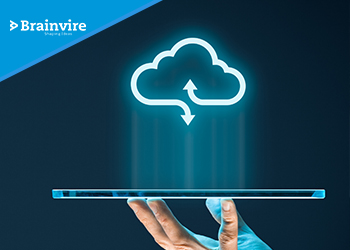
Cloud computing is also used in sectors such as automotive, entertainment, retail, education, healthcare, manufacturing, and finance. This environment needs agile funding from the technology community, as well as a cost-effective approach. That is how the concept of cloud computing took flight. People are perplexed when it comes to cloud computing and serverless computing. By the end of this blog, you’ll have a better idea of what it means.
What exactly is cloud computing?
Cloud computing refers to the on-demand provision of computing facilities as internet-based applications. It removes the need for businesses to purchase, configure, or handle services on their own, and they only pay for what they use.
What is the purpose of cloud computing?
It offers a wide range of possible technologies that can support companies. Here are some examples:
Framework scalability
Cloud storage is an architecture scaling leader, and it can handle an organization’s varying scaling power.
Emergency Restorations
In the event of an emergency, the company will still use the supported computer service to recover and backup their specialized tools.
Data Stockpiling
Cloud storage relieves overburdened server realms by storing vast quantities of data, making it more convenient, expediting analysis, and making support more manageable.
Application enhancement
The Cloud Computing service provides developers with quick access to software and platforms for design and computing applications, reducing time to run.
Why is cloud computing advantageous?
It’s Secure.
If any enterprise wants to manage with protection, cloud computing is the only best way to get it. Cloud Computing services have a firmer grip on the server and experiences. They have experts who guarantee the reliability of your data storage with the most efficient data hub.
It’s effective
Businesses are assured of security, so they can confidently create a dependable application with cloud-based support without bothering about maintenance.
It’s value for money
Cloud computing is the easiest and most reliable way of storing data. Services models such as Baas, Faas, PaaS, and serverless services are extremely beneficial to developers and businesses when developing apps and tools. It ensures a high ROI, making it the best bang for your buck.
It is versatile
Because of its architecture, cloud computing services provide internet connectivity at any time and from any place. They have a high-level scaling service on which companies can focus.
Let’s learn about Cloud Infrastructure models.
Pass – The Platform-as-a-Service (PaaS) paradigm involves renting the back end mechanism to a cloud service provider, such as designing tools, operating systems, storage, and other necessities for creating an application. Database administration and middleware are also examples of PaaS applications. This is one of the four cloud computing service types.
IaaS: (Infrastructure-as-a-Service) is one of the four major Cloud Computing models. The corporation hires cloud computing services to manage the cloud resources for the IaaS service. It is more adaptable in terms of technology growth, data storage, and on-premises hosting. IaaS is a cloud storage provider that helps you to pay for IT infrastructure servers, warehouses, processes, and operating systems pay-as-you-use.
Saas – Software-as-a-Service is one of the Cloud computing models. Serverless computing, which is similar to PaaS, focuses on developing software features without having to waste time actively running servers and providing support. The cloud provider performs the setup, planning, server maintenance, building, measuring, performing, and managing of software applications. PaaS is intended to make it easy for developers to build Online or smartphone apps without having to think about configuring or running the underlying support of servers, security, framework, and necessary data for improvement.
Serverless
Serverless computing is a cloud service and technique that offers as-needed templates such as Baas, FaaS. Both of these models are provided as a service by serverless cloud vendors, where the customer is only paying when they are used daily; there is no fixed fee and it is auto-scaling, unlike most networks such as mobile network providers.
The Two Approaches of Serverless Computing
Baas – Backend-as-a-Service (BaaS) is cloud-based computing in which developers outsource all back-end operations before front-end production. It aids in the pre-writing of applications for server-based operations such as user authentication, remote updating, notification, cloud storage, hosting, and remote updating. It makes the work of the frontend developer simpler.
Faas– Function-as-a-Service (FaaS) is a serverless solution to modular programming. This allows developers to write code more easily bit by bit, making reading and checking code simpler and lowering the cost of upgrading. This can be done in any case with secure code scaling and maximum bang for the buck.
FaaS allows developers to write and update code on the fly, which can then be executed in response to an incident, such as a user clicking on a web application feature. This makes it easier to scale code and cost-effectively incorporate other microservices.
Let us discuss the best serverless Cloud computing platforms from a non-technical standpoint.
AWS LAMBDA
Amazon Web Service (AWS) was a pioneer in attempting serverless computation with the AWS Lambda result. As the largest cloud service provider, AWS has superimposed its offerings on the enterprise’s reductions and growth. They launched AWS FARGATE, which is the power of its serverless operation, as serverless computing progressed.
AWS FARGATE
AWS FARGATE allows the use and operation of containers without incurring the costs of scaling, reinforcing, protecting, or managing servers. Developers can launch and scale the computation to precisely satisfy the container support demands. With dedicated core operating-time configurations, it guarantees workload privacy and security. It is used to handle the programs with AWS settings.
Functions of AWS LAMBDA
- Builds Strong Back-end Applications
- It supports any code, like Nodejs, Powershell, C#, Python and Ruby Code, Java, and Go.
- It offers automated administration.
- Scaling by itself
- It deals with relational database
- Control over performance Excellent connectivity with shared file systems
- It streamlines a variety of activities.
- A private security standard
- Pay-as-you-use
AZURE BY MICROSOFT
Azure is a Microsoft computing service and one of the best serverless computing providers. Since it is based on Microsoft technologies, it can easily be integrated with other Microsoft tools and applications. You can start with Azure and work your way up to writing functions. It is ideal for businesses looking for a low-cost serverless computing service.
Functions of Azure
- Scaling that is automated and flexible
- The United States corporate model
- Application Monitoring
- Build Container Image
- End-to-End Growth
- Set memory and compute support are needed.
- System result and upkeep
- Pay-only-for-requested-computing
GOOGLE CLOUD PLATFORM
GCP enables you to prepare, create, and use functions and frameworks as reference languages or containers, all while evaluating the developer experience and reducing support management. The advantages are comparable to those of Azure and AWS.
Benefits of GCP:
- Agile Development
- Secure
- More appropriate deployment
- Smooth Enforceability
- Scaling that is automated
- Excellent API management
Conclusion
So, we’ve seen how Cloud computing operates and what sorts of resources and advantages it brings to companies depending on their needs. If you have any more questions or concerns, please contact Brainvire, one of the most reliable cloud computing services.
Related Articles
-
Blockchain and Decentralization: How Does It Relate?
Welcome to the world of infinite possibilities. We are talking about ‘THE NEXT BIG THING’ in the world, Blockchain. You might have read numerous write-ups about Blockchain, what is Blockchain,
-
Top Cloud Computing Service Models To Know About
Cloud computing is a technology that deals with a pool of various computing resources, like servers, networks, and applications. However, it is mainly used as a storage pool that any
-
Cloud Business Intelligence – Top 3 Cloud BI Tools to Gain a Competitive Edge
The latest cloud computing studies suggest that nearly 81% of businesses leverage at least one cloud-based application. This means that you may have already come across a lot of articles



